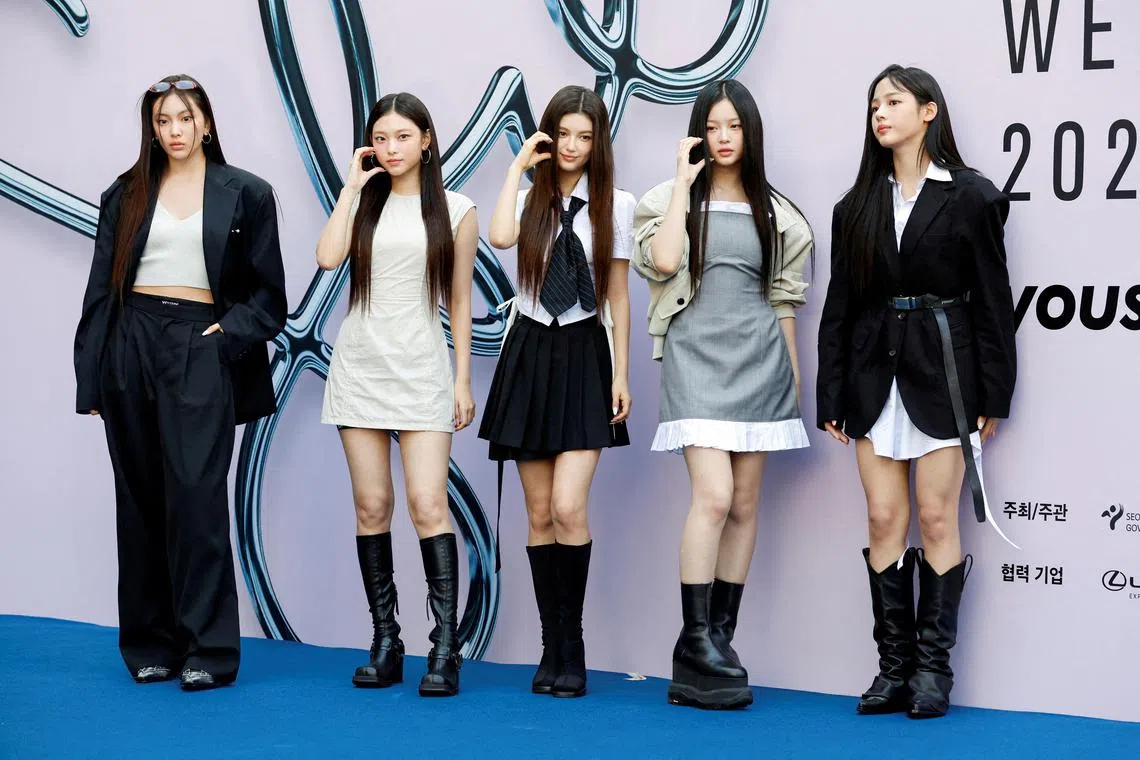K-pop girl group NewJeans’ request to reinstate Min Hee-jin as chief executive rejected
Sign up now: Get ST's newsletters delivered to your inbox

The future of K-pop girl band NewJeans is in peril, as the ex-Ador CEO's request to be reinstated was rejected.
PHOTO: REUTERS
Follow topic:
SEOUL – Ador, the K-pop agency behind NewJeans and a subsidiary of South Korean entertainment company Hybe, confirmed on Sept 25 that it will not honour the girl group’s request to reinstate former chief executive Min Hee-jin.
The agency cited its adherence to Hybe’s principle of separating management and production. However, Ador said Ms Min could continue as both an internal director and NewJeans’ producer.
“The board has resolved to convene an extraordinary shareholders’ meeting to reappoint Min Hee-jin as an internal director,” Ador said in an official statement. “However, the board cannot accept the request for her reinstatement as CEO at this time. Her role and authority as the producer for NewJeans are fully guaranteed, and further discussions on specific terms will take place in the future.”
Ms Min immediately issued a press statement, once again requesting her reinstatement as chief executive to ensure the continued success and performance of the artistes under her guidance.
Ador’s decision leaves NewJeans with limited options.
The quintet – comprising members Minji, Hanni, Danielle, Haerin and Hyein, aged between 16 and 20 – must either remain at Hybe under the leadership of Ador’s new chief executive Kim Ju-young, find legal grounds for contract violations to take action and part ways, or pay a substantial penalty to terminate their contract and work with Ms Min outside Ador.
On Sept 11, NewJeans broke their silence on the ongoing dispute between Ms Min and Hybe, stating: “What we want is for Ador to return to its original state, with (former) CEO Min Hee-jin overseeing both management and production. We believe this is the way to coexist peacefully with Hybe without conflict.”
The statement is seen as a strategic move, likely preparing for potential legal action. Before filing an injunction to suspend the group’s exclusive contract, NewJeans appear to be giving Hybe, which they consider the liable party, a chance to correct any violations.
According to Article 15 of the Standard Contract for Popular Culture and Arts Professionals, proposed by the Korea Fair Trade Commission, if either the agency or artiste breaches the contract, the other party may request the breach be corrected within 14 days.
If the breach is not rectified within this period, the contract may be terminated and damages may be claimed. This was why NewJeans set a deadline of Sept 25, two weeks after their live broadcast on Sept 11, for a response from Hybe.
However, even if NewJeans pursue a contract termination lawsuit after 14 days, basing their case on Ms Min’s dismissal may not be sufficient.
“NewJeans are likely to argue for a suspension of the contract’s validity based on Ador’s failure to meet its obligations or a breakdown in the trust relationship. However, it is difficult to claim that Ador has violated key contractual obligations, such as payment settlements,” said Dr Lee Jae-kyoung, a professor at Konkuk University Law School and president of the Korea Entertainment Law Society, on Sept 25.
“NewJeans’ request for Min’s reinstatement as CEO would interfere with management decisions, which may not be a legally persuasive argument in court.”
Another option for NewJeans is to terminate the contract by paying a penalty, reportedly estimated to be between 300 billion won (S$292 million) and 500 billion won.
The exact penalty amount is unknown, as the details of NewJeans’ contract have not been publicly disclosed. However, according to South Korea’s Ministry of Culture, Sports and Tourism’s standard exclusive contract, penalties are calculated based on the artiste’s average monthly sales over the past two years, multiplied by the remaining months in the contract.
NewJeans are believed to have about five years left in the contract and Ador’s revenue over the past two years is estimated to be around 190 billion won. This places the penalty for termination in the range of 450 billion to 500 billion won, making contract termination a financially challenging route.
However, music critic Lim Hee-yun believes paying the penalty might be the easiest solution if the band insist on their original request.
“Just as G-Dragon joined Galaxy Corporation, a relatively unknown IT company, it’s possible that a wealthy, random company could step in and take them on,” he said on Sept 25, referring to the rapper-singer from K-pop boy band BigBang. THE KOREA HERALD/ASIA NEWS NETWORK

